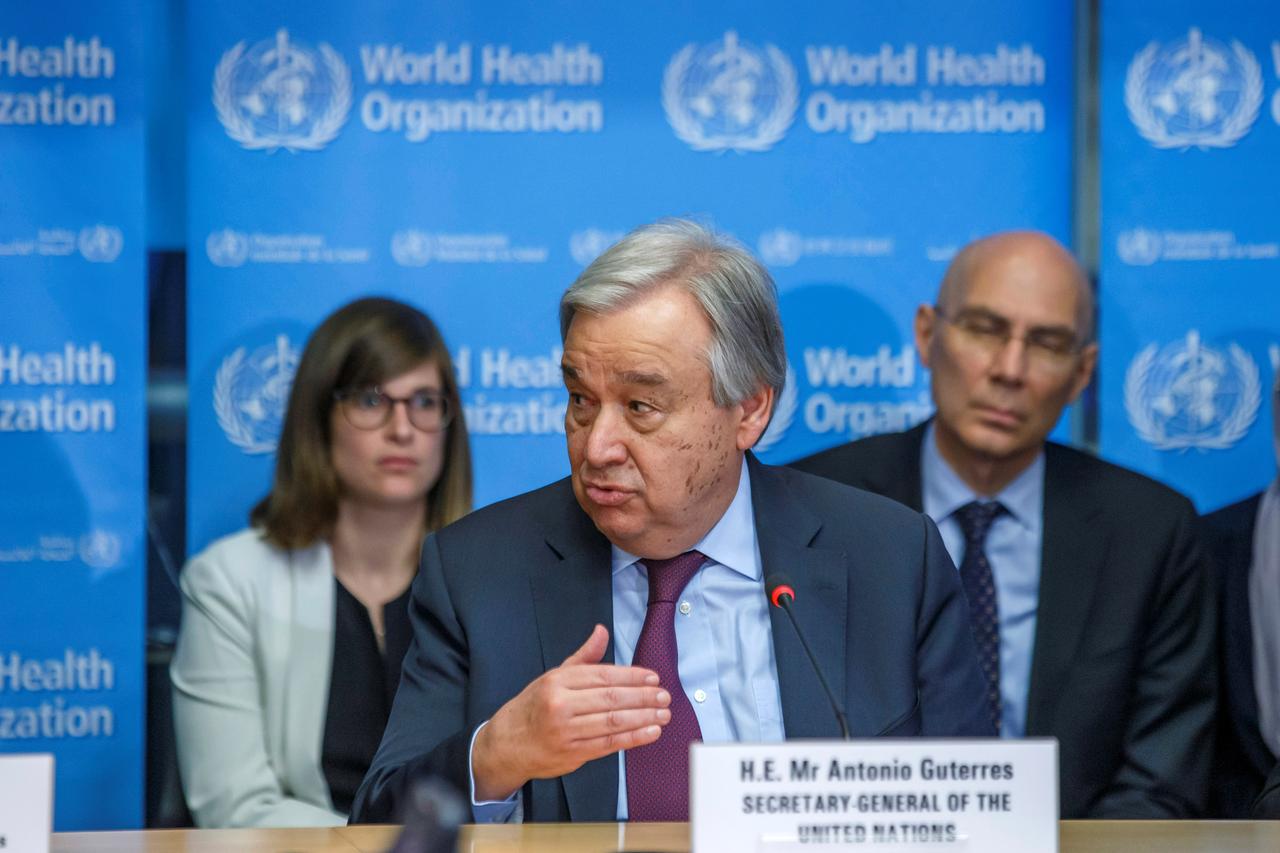When international cooperation is most needed, it falls short
https://arab.news/v2uex

In a unique virtual gathering of UN member states on Friday, Secretary-General Antonio Guterres asked wealthier countries to help fund an appeal for $2 billion to help the world’s most vulnerable countries battle the coronavirus disease (COVID-19). The meeting highlighted the importance of the UN and multilateralism more broadly in responding to the pandemic.
A pandemic is one of the events that most clearly demonstrates that we live in a globalized world, where a problem in one country can quickly become a problem for many others. Successful mitigation of a pandemic requires a coordinated global response.
Unfortunately, COVID-19 has hit at a time when faith in multilateralism and in the post-Second World War global order is at a historic low. Trends such as digitalization, demographic changes, a diffusion of geopolitical and economic power, the rise of China, the 2008 global financial crisis, and rising authoritarian tendencies in multiple democracies have placed growing pressure on the system. At a time when lives and economies depend on countries working together, they have become less inclined to do so.
COVID-19 has demonstrated both the value that multilateralism offers at a time of crisis and the extent to which global cooperation has eroded. Fighting a pandemic requires the sharing of reliable information on the nature of the disease, its spread, and potential treatments. The World Health Organization (WHO) plays an essential role in coordinating information sharing, as well as disseminating science-based information, providing medical equipment and testing kits to many countries, sending health experts to key areas, and facilitating cooperation between actors such as governments and nongovernmental organizations (NGOs) that provide critical services. Global institutions and NGOs can provide essential supplies to places that need it most, either because the virus is hitting an area hard or because a country or locality lacks the health care system and equipment needed to respond. The UN is also working to establish a fund to provide aid to countries that have the fewest resources to respond to the outbreak.
Another benefit of global institutions is that they can provide essential supplies and services to countries suffering an outbreak or the resulting economic crisis without making those countries obligated to specific powerful states, such as China or the US. In this way, multilateral institutions can help preserve sovereignty and ensure that resources are allocated based on need more than political interest.
COVID-19 is not only a public health crisis; it also is an economic crisis. Multilateral institutions are essential to providing aid to the countries least able to manage the economic impacts and to help resuscitate the global economy quickly. The G20 played a key role in coordinating responses to the 2008 financial crisis, helping to prevent an even worse global economic crisis. The World Bank, International Monetary Fund (IMF), G7, G20, regional banks, and other institutions have important roles to play in helping the global economy return to health.
Unfortunately, the weakening of these multilateral institutions in recent years is hindering a coordinated, global response to COVID-19. Thursday’s video meeting of G20 leaders led to promises to work with multilateral institutions to boost the global economy, but did not produce significant coordinated action or address a key IMF request. The EU has delayed action on significant economic measures, reflecting deep divisions between key states. European Commission President Ursula von der Leyen last week accused multiple EU countries of failing to work together, saying: “When Europe really needed an all-for-one spirit, too many initially gave an only-for-me response.” Some countries’ governments and leaders ignored or downplayed WHO warnings and advice about COVID-19.
The coronavirus has demonstrated the value and the limitations of state sovereignty. Governments are right to prioritize meeting the needs of their citizens. Sometimes measures such as reducing travel from other countries and even closing borders are necessary and appropriate. Some countries might be wise to consider reining in some supply chains and boosting the production of key supplies domestically. At the same time, no country can successfully respond to the pandemic alone. Barriers and border shutdowns will not keep diseases out indefinitely. Countries still need each other for essential supplies and aid. For example, the US has sought to purchase medical supplies from other countries; the UN has donated face masks to New York City; several countries, including the US and China, have donated or sold supplies to other countries; Iran has requested help from the IMF for the first time in decades; and there are many more examples. Furthermore, no developed economy has a chance of full recovery unless the global economy also begins to recover.
The coronavirus has demonstrated the value and the limitations of state sovereignty.
Kerry Boyd Anderson
One lesson learned from the COVID-19 outbreak should be the importance of multilateral institutions and global cooperation in responding to global problems. Indeed, international cooperation will be crucial to rebuilding the global economy. Well beyond the pandemic, such cooperation will be necessary in addressing other threats like climate change and preventing world wars.
The alternative is that an “every country for itself” approach to COVID-19 and economic recovery further erodes and maybe even destroys the global political order and badly damages the global economy. That would be another disaster. Countries’ leaders should keep in mind that multilateralism is not about a naive belief in countries coexisting in peace and love; rather, it is a clear-eyed recognition that countries often best serve their own interests through working together — especially in a pandemic.
- Kerry Boyd Anderson is a writer and political risk consultant with more than 16 years’ experience as a professional analyst of international security issues and Middle East political and business risk. Her previous positions include deputy director for advisory with Oxford Analytica and managing editor of Arms Control Today. Twitter: @KBAresearch









































